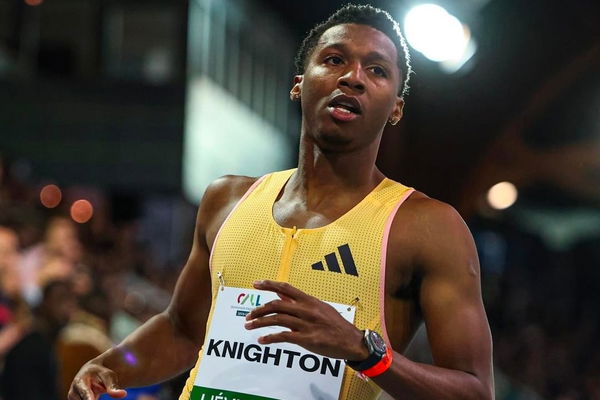

While controversies in track and field are nothing new, the latest ones have shocked many. Erriyon Knighton and Issam Asinga, two bright sprinters, are embroiled in doping scandals, yet their paths couldn’t be more dissimilar. Knighton is free to compete, but Asinga will serve a four-year suspension.
Issam Asinga, who sparked waves in the track and field by breaking the Under-20 100-meter record, was severely punished. Due to a positive test result for the prohibited endurance enhancer GW1516, the Athletics Integrity Unit (AIU) decided against him. Asinga has continued to insist on his innocence, blaming the favorable outcome on contaminated recovery gummies. However, Erriyon Knighton, on the other hand, has been permitted to compete despite testing positive for trenbolone after the USADA determined that his case was an outcome of contaminated meat.
ADVERTISEMENT
Article continues below this ad
Issam Asinga’s ban after contaminated gummies
The case of Issam Asinga has been complicated. After annoying world champion Noah Lyles in April 2023, the sprinter’s career took off, but now he faces a four-year ban and the loss of his records. Asinga asserts that Gatorade’s contaminated recovery gummies included the prohibited material GW1516. He claims that after winning the Gatorade Athlete of the Year award, he received a gift package that included these gummies.
Moreover, he made arguments, but the AIU wasn’t convinced. Two containers of the gummies were submitted by Asinga for testing, which identified the presence of the prohibited material. Asinga did not, according to the AIU, fulfill the burden of proof of proving that the drug discovered in his system originated from the gummies. In an attempt to clear his name before the Paris Games, Asinga has announced his intention to appeal the judgment to the Court of Arbitration for Sport.
However, Asinga addressed his fury in a strange Instagram story, writing, “Idk if it’s just me but sumn not adding up.” This message expresses his sense of unfairness in his circumstances. His comments have been echoed by supporters and other players who doubt the fairness and consistency of anti-doping laws. Also, there might be a possibility that his words echo Erriyon Knighton’s decision.
Erriyon Knighton’s positive test
On one side, Asinga fights his suspension, and Erriyon Knighton’s experience has been better. An arbitration panel released Knighton after he tested positive for trenbolone during an out-of-competition test. The panel agreed with his defense, which stated that contaminated meat from a Florida bakery was the cause of the positive test. To match Knighton’s claim, USADA conducted a comprehensive investigation that included collecting and analyzing the meat and also interacting with him, his family, and the bakery workers.
ADVERTISEMENT
Article continues below this ad
Issam Asinga 🗣️ https://t.co/3eVX9kV0Jr pic.twitter.com/ZeSMxDyMK6
— Track Spice 🌶️ (@trackspice) June 20, 2024
ADVERTISEMENT
Article continues below this ad
Furthermore, the choice has not been made without investigation. The different results for Asinga and Knighton have drawn criticism from track and field enthusiasts. The dispute is best summarized in this tweet from the “Track Spice” handle. “We did what the rules require us to do in all positive cases,” reported USADA CEO, Travis T. Tygart. “We can take comfort that justice was served and transparency as required by the rules was achieved.”
Thus, these incidents draw attention to important problems in the sports industry. Concerns questioning the standardization of anti-doping enforcement are raised by the differences in the approach taken in Asinga and Knighton’s cases. Athletes and supporters contend that to ensure that all individuals are held to identical norms, the framework requires to be more transparent and fair.
ADVERTISEMENT
ADVERTISEMENT
ADVERTISEMENT
ADVERTISEMENT

